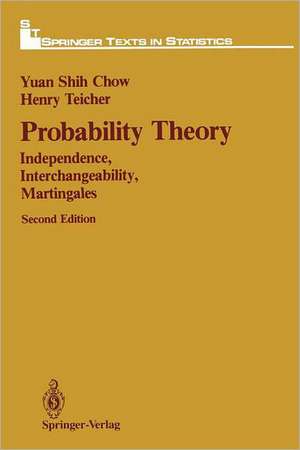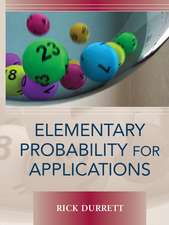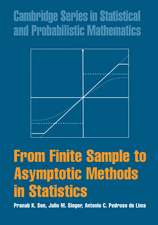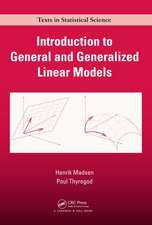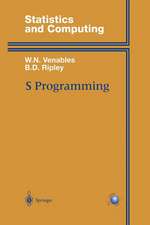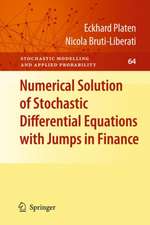Probability Theory: Independence, Interchangeability, Martingales: Springer Texts in Statistics
Autor Yuan S. Chow, Henry Teicheren Limba Engleză Paperback – 2 feb 2012
Din seria Springer Texts in Statistics
-
 Preț: 400.60 lei
Preț: 400.60 lei - 15%
 Preț: 559.21 lei
Preț: 559.21 lei - 18%
 Preț: 903.62 lei
Preț: 903.62 lei - 20%
 Preț: 764.93 lei
Preț: 764.93 lei - 20%
 Preț: 643.55 lei
Preț: 643.55 lei - 20%
 Preț: 717.71 lei
Preț: 717.71 lei - 13%
 Preț: 486.97 lei
Preț: 486.97 lei - 20%
 Preț: 633.82 lei
Preț: 633.82 lei - 20%
 Preț: 697.48 lei
Preț: 697.48 lei - 15%
 Preț: 676.86 lei
Preț: 676.86 lei - 15%
 Preț: 621.10 lei
Preț: 621.10 lei - 20%
 Preț: 700.51 lei
Preț: 700.51 lei - 18%
 Preț: 743.11 lei
Preț: 743.11 lei - 18%
 Preț: 695.29 lei
Preț: 695.29 lei -
 Preț: 253.64 lei
Preț: 253.64 lei - 17%
 Preț: 525.27 lei
Preț: 525.27 lei - 17%
 Preț: 428.39 lei
Preț: 428.39 lei - 19%
 Preț: 571.81 lei
Preț: 571.81 lei - 20%
 Preț: 567.30 lei
Preț: 567.30 lei -
 Preț: 359.54 lei
Preț: 359.54 lei -
 Preț: 477.28 lei
Preț: 477.28 lei - 20%
 Preț: 570.35 lei
Preț: 570.35 lei - 15%
 Preț: 650.86 lei
Preț: 650.86 lei - 19%
 Preț: 626.93 lei
Preț: 626.93 lei - 18%
 Preț: 948.29 lei
Preț: 948.29 lei -
 Preț: 500.46 lei
Preț: 500.46 lei - 18%
 Preț: 746.59 lei
Preț: 746.59 lei -
 Preț: 403.75 lei
Preț: 403.75 lei -
 Preț: 403.37 lei
Preț: 403.37 lei -
 Preț: 394.71 lei
Preț: 394.71 lei - 18%
 Preț: 946.69 lei
Preț: 946.69 lei - 15%
 Preț: 578.67 lei
Preț: 578.67 lei - 15%
 Preț: 702.54 lei
Preț: 702.54 lei -
 Preț: 407.01 lei
Preț: 407.01 lei - 18%
 Preț: 895.89 lei
Preț: 895.89 lei - 15%
 Preț: 600.80 lei
Preț: 600.80 lei - 23%
 Preț: 684.78 lei
Preț: 684.78 lei - 19%
 Preț: 543.08 lei
Preț: 543.08 lei - 15%
 Preț: 595.86 lei
Preț: 595.86 lei -
 Preț: 423.18 lei
Preț: 423.18 lei - 15%
 Preț: 656.10 lei
Preț: 656.10 lei - 15%
 Preț: 682.90 lei
Preț: 682.90 lei - 18%
 Preț: 814.43 lei
Preț: 814.43 lei -
 Preț: 402.76 lei
Preț: 402.76 lei -
 Preț: 408.54 lei
Preț: 408.54 lei
Preț: 399.12 lei
Nou
Puncte Express: 599
Preț estimativ în valută:
76.38€ • 79.45$ • 63.06£
76.38€ • 79.45$ • 63.06£
Carte tipărită la comandă
Livrare economică 14-28 aprilie
Preluare comenzi: 021 569.72.76
Specificații
ISBN-13: 9781468405064
ISBN-10: 1468405063
Pagini: 488
Ilustrații: XVIII, 467 p.
Dimensiuni: 155 x 235 x 26 mm
Greutate: 0.68 kg
Ediția:Softcover reprint of the original 2nd ed. 1988
Editura: Springer
Colecția Springer
Seria Springer Texts in Statistics
Locul publicării:New York, NY, United States
ISBN-10: 1468405063
Pagini: 488
Ilustrații: XVIII, 467 p.
Dimensiuni: 155 x 235 x 26 mm
Greutate: 0.68 kg
Ediția:Softcover reprint of the original 2nd ed. 1988
Editura: Springer
Colecția Springer
Seria Springer Texts in Statistics
Locul publicării:New York, NY, United States
Public țintă
Lower undergraduateCuprins
1 Classes of Sets, Measures, and Probability Spaces.- 1.1 Sets and set operations.- 1.2 Spaces and indicators.- 1.3 Sigma-algebras, measurable spaces, and product spaces.- 1.4 Measurable transformations.- 1.5 Additive set functions, measures, and probability spaces.- 1.6 Induced measures and distribution functions.- 2 Binomial Random Variables.- 2.1 Poisson theorem, interchangeable events, and their limiting probabilities.- 2.2 Bernoulli, Borel theorems.- 2.3 Central limit theorem for binomial random variables, large deviations.- 3 Independence.- 3.1 Independence, random allocation of balls into cells.- 3.2 Borel-Cantelli theorem, characterization of independence, Kolmogorov zero-one law.- 3.3 Convergence in probability, almost certain convergence, and their equivalence for sums of independent random variables.- 3.4 Bernoulli trials.- 4 Integration in a Probability Space.- 4.1 Definition, properties of the integral, monotone convergence theorem.- 4.2 Indefinite integrals, uniform integrability, mean convergence.- 4.3 Jensen, Hölder, Schwarz inequalities.- 5 Sums of Independent Random Variables.- 5.1 Three series theorem.- 5.2 Laws of large numbers.- 5.3 Stopping times, copies of stopping times, Wald’s equation.- 5.4 Chung-Fuchs theorem, elementary renewal theorem, optimal stopping.- 6 Measure Extensions, Lebesgue-Stieltjes Measure, Kolmogorov Consistency Theorem.- 6.1 Measure extensions, Lebesgue-Stieltjes measure.- 6.2 Integration in a measure space.- 6.3 Product measure, Fubini’s theorem, n-dimensional Lebesgue-Stieltjes measure.- 6.4 Infinite-dimensional product measure space, Kolmogorov consistency theorem.- 6.5 Absolute continuity of measures, distribution functions; Radon-Nikodym theorem.- 7 Conditional Expectation, Conditional Independence, Introduction toMartingales.- 7.1 Conditional expectations.- 7.2 Conditional probabilities, conditional probability measures.- 7.3 Conditional independence, interchangeable random variables.- 7.4 Introduction to martingales.- 8 Distribution Functions and Characteristic Functions.- 8.1 Convergence of distribution functions, uniform integrability, Helly—Bray theorem.- 8.2 Weak compactness, Fréchet-Shohat, Glivenko- Cantelli theorems.- 8.3 Characteristic functions, inversion formula, Lévy continuity theorem.- 8.4 The nature of characteristic functions, analytic characteristic functions, Cramér-Lévy theorem.- 8.5 Remarks on k-dimensional distribution functions and characteristic functions.- 9 Central Limit Theorems.- 9.1 Independent components.- 9.2 Interchangeable components.- 9.3 The martingale case.- 9.4 Miscellaneous central limit theorems.- 9.5 Central limit theorems for double arrays.- 10 Limit Theorems for Independent Random Variables.- 10.1 Laws of large numbers.- 10.2 Law of the iterated logarithm.- 10.3 Marcinkiewicz-Zygmund inequality, dominated ergodic theorems.- 10.4 Maxima of random walks.- 11 Martingales.- 11.1 Upcrossing inequality and convergence.- 11.2 Martingale extension of Marcinkiewicz-Zygmund inequalities.- 11.3 Convex function inequalities for martingales.- 11.4 Stochastic inequalities.- 12 Infinitely Divisible Laws.- 12.1 Infinitely divisible characteristic functions.- 12.2 Infinitely divisible laws as limits.- 12.3 Stable laws.
